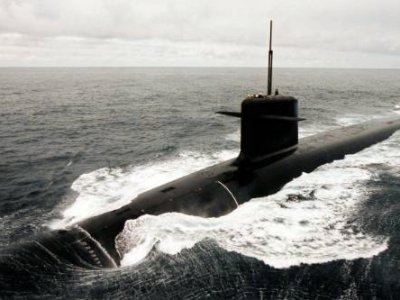
Nuclear Submarines: Israel's Got 'Em
While the recent talks over Iran’s nuclear status have proceeded cordially and so far have failed to spike gasoline prices upwards, several things have shown up in the periphery of the news that really deserve closer attention and scrutiny: Israel has nuclear submarines, Iran has really been working hard on developing nuclear weapons, and that development was done in conjunction with Russia.
Israel’s recent purchase of submarines from Germany was done in order to provide Israel with a credible deterrent. With the submarines, it can position its nuclear forces secretly, away from its limited land territories. This gives Israel the ability to ensure mutually-assured destruction for any of its possible foes. Public knowledge of this capability serves as a deterrent against Israel’s enemies and, hopefully, creates a balance of terror necessary to restrain actual nuclear war from happening.
To be sure, such a balance of terror existed in 1972 and that balance failed to restrict President Nixon from exercising his “madman option”: he flew US nuclear bombers dangerously close to Soviet airspace in order to try to force them to get the North Vietnamese to accept a peace deal with the USA and South Vietnam. True, Nixon got his peace – which allowed the NVA to maintain troops inside of South Vietnamese territory – but at the risk of almost triggering Russia’s own madman option, which could have led to a nuclear exchange between the two nations. Israel’s ownership of retaliatory capability, therefore, does not guarantee that other nations will shy away from challenging it in the nuclear field.
The revelation from the IAEA that Iran was much further along in nuclear weapons development flies directly in the face of the US assessment that it wasn’t. The National Intelligence Estimate that Iran wasn’t developing nuclear weapons allows the US some flexibility in negotiations. The IAEA report, which the US publicly questions, does not allow that flexibility. The IAEA report was not a public one: its contents were leaked to the New York Times, which means someone opposing the president’s stance was behind the leak.
The Times of London reported that Israel confronted Russia with detailed information that Russian scientists were aiding Iranians in developing nuclear weapons. Instead of outright denials, Russia has been totally silent. This is ominous.
The two leaks point to either failures in the US’ intelligence operations or selective reporting of intelligence to the public. Either way, they are reminiscent of the intelligence failures that led up to the US invasion of Iraq in 2003. A mistake in the current Israeli-Iranian tensions, however, could have much more severe consequences than the Iraqi invasion. That one only spiked oil prices and led to a costly and brutal US occupation. This current crisis has a nuclear dimension. The mistakes of Iraq were conventional and we could learn from them: to quote Robert McNamara, “Nations were not destroyed.” A mistake between Israel and Iran could be nuclear, which could result in the destruction of nations.
so a nuclear war could happen…wow not good
Are there any nations left that don’t have the ability to get nuclear weapons?
Any nation could acquire one. Large corporations could acquire them, truth be told. Eventually, some organization that “shouldn’t have one” will get one and trigger a war either by using it or by declaring that it has one and plans to use it.
Arent there restrictions to building and manufacturing these weapons?
Yes. That doesn’t mean they’ll be respected.